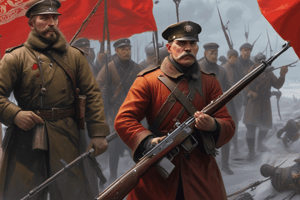Podcast
Questions and Answers
What was the outcome of the Russian Civil War?
What was the outcome of the Russian Civil War?
- The rise of the Russian monarchy
- The establishment of a democratic government
- The division of Russia into smaller states
- The establishment of the Soviet Union (correct)
Who led the Bolsheviks?
Who led the Bolsheviks?
- Karl Marx
- Joseph Stalin
- Vladimir Lenin (correct)
- Friedrich Engels
What is the goal of communism according to Marxist ideology?
What is the goal of communism according to Marxist ideology?
- A feudal society
- A classless society (correct)
- A class-based society
- A capitalist society
What is the term for the process by which workers are disconnected from their labor?
What is the term for the process by which workers are disconnected from their labor?
Which of the following socialist parties was established in Germany?
Which of the following socialist parties was established in Germany?
What was the Paris Commune?
What was the Paris Commune?
Who was the key figure in the French Socialist Party?
Who was the key figure in the French Socialist Party?
When was the Second International founded?
When was the Second International founded?
What was the result of the Russian Revolution on socialist movements across Europe?
What was the result of the Russian Revolution on socialist movements across Europe?
When did the Bolsheviks seize power in Petrograd?
When did the Bolsheviks seize power in Petrograd?
Flashcards are hidden until you start studying
Study Notes
Russian Civil War
- Lasted from 1917 to 1922
- Fought between the Bolsheviks (Red Army) and the anti-Bolsheviks (White Army)
- Resulted in the Bolsheviks establishing the Soviet Union
- Key events:
- October 1917: Bolsheviks seize power in Petrograd
- 1918: Civil War begins
- 1919: Red Army defeats White Army
- 1922: Bolsheviks establish Soviet Union
Paris Commune
- Established in 1871 in Paris, France
- First government in history to be controlled by the working class
- Lasted for 72 days
- Key events:
- March 1871: Paris Commune is established
- May 1871: French government crushes the Commune
- Estimated 20,000-30,000 people killed
Rise Of Bolsheviks
- Led by Vladimir Lenin
- Bolsheviks were a faction of the Russian Social Democratic Labor Party
- Key events:
- 1903: Bolsheviks split from Mensheviks
- 1917: Bolsheviks seize power in Petrograd
- 1918: Bolsheviks establish the Soviet Union
Marxist Ideology
- Developed by Karl Marx and Friedrich Engels
- Key principles:
- Dialectical materialism: history is driven by class struggle
- Classless society: goal of communism
- Proletariat: working class
- Bourgeoisie: capitalist class
- Alienation: workers are disconnected from their labor
European Socialist Movements
- Key movements:
- German Socialist Democratic Party (SPD)
- French Socialist Party (PSF)
- British Labour Party
- Italian Socialist Party (PSI)
- Key figures:
- Rosa Luxemburg (Germany)
- Jean Jaurès (France)
- Keir Hardie (UK)
- Filippo Turati (Italy)
- Key events:
- 1889: Second International founded
- 1914: Socialist parties divide over World War I
- 1917: Russian Revolution inspires socialist movements across Europe
Russian Civil War
- Lasted from 1917 to 1922, resulting in the Bolsheviks establishing the Soviet Union
- Fought between the Bolsheviks (Red Army) and the anti-Bolsheviks (White Army)
- Key events:
- October 1917: Bolsheviks seize power in Petrograd, marking the beginning of the end of the provisional government
- 1918: Civil War begins, with the Red Army fighting against the White Army and foreign intervention
- 1919: Red Army defeats White Army, solidifying Bolshevik control
- 1922: Bolsheviks establish Soviet Union, marking the end of the Russian Civil War
Paris Commune
- Established in 1871 in Paris, France, as the first government in history to be controlled by the working class
- Lasted for 72 days, from March 18 to May 28, 1871
- Key events:
- March 18, 1871: Paris Commune is established, with the working class seizing power and instituting radical reforms
- May 21-28, 1871: French government crushes the Commune, resulting in an estimated 20,000-30,000 people killed
Rise Of Bolsheviks
- Led by Vladimir Lenin, who returned to Russia in 1917 after years of exile
- Bolsheviks were a faction of the Russian Social Democratic Labor Party, which split from the Mensheviks in 1903
- Key events:
- 1903: Bolsheviks split from Mensheviks, marking a significant divide in the Russian socialist movement
- 1917: Bolsheviks seize power in Petrograd, capitalizing on the February Revolution and the provisional government's weakness
- 1918: Bolsheviks establish the Soviet Union, with Lenin as the first head of state
Marxist Ideology
- Developed by Karl Marx and Friedrich Engels, with key principles:
- Dialectical materialism: history is driven by class struggle between the proletariat (working class) and the bourgeoisie (capitalist class)
- Classless society: the ultimate goal of communism, where the means of production are collectively owned and class distinctions are abolished
- Alienation: workers are disconnected from their labor, leading to feelings of powerlessness and exploitation
European Socialist Movements
- Key movements:
- German Socialist Democratic Party (SPD), founded in 1875
- French Socialist Party (PSF), founded in 1905
- British Labour Party, founded in 1900
- Italian Socialist Party (PSI), founded in 1892
- Key figures:
- Rosa Luxemburg (Germany), a prominent Marxist theorist and activist
- Jean Jaurès (France), a leading figure in the French socialist movement
- Keir Hardie (UK), a founder of the British Labour Party
- Filippo Turati (Italy), a leading figure in the Italian socialist movement
- Key events:
- 1889: Second International founded, uniting socialist parties across Europe
- 1914: Socialist parties divide over World War I, with some supporting their national governments and others opposing the war
- 1917: Russian Revolution inspires socialist movements across Europe, with many parties adopting more radical stances
Studying That Suits You
Use AI to generate personalized quizzes and flashcards to suit your learning preferences.




